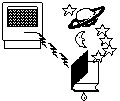
Caravan
Chapter 2

| Home |
Bibliography |
The Ingesterie Stephen Goldin's Blog |
Submitted for Your Approval |
Contact Information |
 |
Caravan
|
 |

--Los
Angeles Times
Wednesday September 11, 1974
Communication is one of the Big Three of any civilization. People and organizations can only interact to the extent that they can communicate with one another. Little or no communication means suspicion, hatred and conflict. As communications increase and improve the foreign becomes less fearful, and peaceful interaction becomes feasible….
In the time of the Greeks the manageable political unit was the city-state, and its size was determined by how far a man could walk in a day. This ensured that everyone would be no more than one day out of touch with current events. Neighboring city-states, with whom communication was far less frequent and far more out-of-date, were treated with distrust.
Communications today are practically instantaneous anywhere on the globe. That fact has enabled us to develop a global civilization. But, in building this network so quickly, we may have stretched ourselves too far. Like a rubber band extended past its breaking point, the snap backwards will be sharp and painful….
As Peter approached the first vehicle, he was startled to see that it was an armored truck, the type that used to carry money to banks and stores. It sat squat and ominous, its square gray shape impassive before him. The spotlight from its roof stung his eyes, which were accustomed to the darkness, but he could make out that the second vehicle in the train was also armored. The rest of the cars behind it were just dim shapes in shadows; Peter could not tell how many there were or what they looked like.
A lean figure got out of the second truck and came over to meet him at the door of the first. It was Kudjo Wilson. "Glad you could make it," he said, opening the door on the passenger side of the truck's cab. "Let me make the introductions."
He stuck his head inside the cab. "Honon, this is my man Peter. Peter, may I present to you the honorable, the distinguished, the inestimable Israel Baumberg."
There was a small battery-powered lantern glowing inside the cab, and it cast sufficient light for Peter to make out the man he was being introduced to. Even seated, Israel Baumberg was a big man, with broad shoulders and powerful arms. Standing, he must easily have been six foot three or four. His hair was straight and black, cut short in almost a bowl haircut. His face was lined and weathered, looking more like finely tanned leather than flesh. It was hard to distinguish skin tones in the feeble light, but from the structure of the features Peter would have guessed that this man was dark-complected. An automatic rifle and a machine gun were propped casually beside him.
"Welcome to our caravan, Mr. Smith. Come on in." As Peter entered, the other peered at him through the faint glow. "Or should I say Mr. Stone? This is an unexpected honor."
Peter grimaced. The recognition was unwelcome; too many people harbored bad feelings toward him. But he climbed into the cab and sat in the passenger's seat.
"Let me see your arm," the big man continued. "Kudjo told me you'd hurt it." He examined the wound tenderly. "Well, it doesn't look too bad, but we don't want any nasty surprises along the way so we'd better have it tended to. Kudjo, could you go back and see if Sarah's free? And while you're at it, check on how they're coming with dinner."
"Yassa, Boss," Kudjo grinned in a parody of the old-time subservient blacks. He moved down the line of cars to carry out instructions.
"Good man, that Kudjo. You were lucky to run into him. He used to be an undercover narcotics officer for the St. Louis police. They don't make them any better. As for myself, before you start asking questions, my father was Jewish and my mother was an Indian, and I prefer to go by my Indian name, Honon, which means 'bear.' That's enough about me for the moment. Any questions?"
"Yes--what's this all about?"
"This," Honon spread his hands to include the entourage behind his truck, "is a caravan that Kudjo and I are leading. We are in the process of going from here to there."
"I know where here is, but where's 'there'?"
"That's a long story, which I'll begin in just a minute. We started in San Francisco this time, and have been working our way down the California coast. You're very lucky to have met us; we were coming down route 101 and would have missed this area completely, except that an earthquake wrecked the road just south of Ventura. We had to backtrack up to 138 and across Santa Paula to Interstate 5, which is where we are right now. We'll probably camp here for the night and move on tomorrow."
At this point a woman stuck her head through the open doorway of the passenger side. She looked to be in her forties, with gray-blonde hair and a slightly chubby face. "I hear you've got someone who needs looking at," she said to Honon.
"Right. Peter, this is Dr. Sarah Finkelstein, who will be ministering to our ills this trip. Sarah, I'd like you to meet the notorious Peter Stone."
Peter winced again at the introduction. The doctor looked him up and down critically. "Well, well, well. The Man Who Turned Out To Be Right. Is it any consolation?"
"It never was."
"I suppose not. Well, let's see what you've got?" She examined his wound, clucking silently to herself. "Is your tetanus shot current?" she asked.
"Haven't had one in years."
"It was a silly question, I know, but old habits die hard. You won't be getting one from me, either; I'm out of vaccine. It doesn't look too bad, though. I'll clean it and bandage it for you. You'll be a bit stiff, but you'll survive. As to my next question, it'll sound a little personal but it's necessary. Do you have any venereal disease?"
Peter was startled at her bluntness, but answered no. "Good," she said. "We must try to keep our breeding stock pure." Without further elaboration, she went to work on his arm quietly and efficiently, then left Peter and Honon alone.
"Before I begin my full story," Honon said, "there are a couple of facts needed as preludes. You are familiar, no doubt, with the advances in the field of cryogenics and suspended animation."
Peter nodded. "I mentioned them in my book."
"Yes, that's right. Excuse me, I had forgotten; it's been a while since I've had the time to reread it. As I recall, you didn't have anything complimentary to say about them."
"They were a wasted effort, a futile grabbing for immortality. What possible advantage could there be in freezing someone to be awakened fifty years from now, when all indications were that the world at that time would have difficulty supporting even the few people it would have left? People from the past would be totally helpless in a new world wracked by famine, drought, war and plague. The money and talent that went into that research could have been used better elsewhere."
"Perhaps," Honon said, "but there might have been some ramifications that even you did not foresee."
"Such as?"
"Not so fast. Have you ever heard of a star called Epsilon Eridani?"
"I'm afraid astronomy was never my field."
"Nor mine. But fortunately there were a few people who took an interest in it. A couple years back, before the space program disintegrated completely, they conducted an experiment in what they called satellite parallax--don't ask me to explain it, I can't--and they found that Epsilon Eridani had a whole series of planets, just like our own sun. It was an interesting find, but the world had more pressing problems and paid it little notice.
"At about that same time, a man wrote a book. It was a big book, a powerful book, and it scared a lot of people. It talked about an end to civilization and a return to barbarism because of overpopulation, depletion of raw materials and a general breakdown of cohesive forces. Most people became angry at this because it was a fact that they were afraid to face--"
"You're telling me," Peter muttered.
"--but a few people actually became thoughtful. The author's contentions were unarguable, but these thoughtful people still did not want to see the end of civilization. So they began thinking of alternatives."
"So did I, and I was hated for it. Sure, my suggestions were radical, but I was dealing with a crisis situation. My plans might not have worked, but they couldn't have been any worse than the hell we're going through now."
Honon shrugged. "Who's to say? At any rate, these thoughtful people saw the resentment aimed at you and decided to do their own work secretly. They included some people with a lot of influence, some with a lot of money, and a few with both."
"That always helps."
"So they built their starship--"
Peter gasped. "Hey, wait a minute. I think I missed a step in there. What's this about a starship?"
"Think about it; use that incisive mind of yours. If the Earth is used up, then civilization would stand a better chance elsewhere if it's to continue and grow, correct? Where else is there? Certainly no other planet in our solar system is capable of housing a colony without an enormous technology to back it up. So that leaves us the stars--in particular, Epsilon Eridani."
Peter was about to say something when a little girl knocked on the door of the truck. She was dark-haired, and couldn't have been more than eight or nine years old. "Mister Honon," she said, "I've got some dinner for you and the other man."
"Thanks, Mary." Honon reached out his window and grabbed two bowls from her. "Careful," he said to Peter, as he handed one of them over. "They're hot." The little girl left to go back where she had come from.
The liquid in the bowls was of a consistency halfway between soup and stew. It had potatoes, peas, beans, carrots, soybeans and even small pieces of chicken--practically a smorgasbord by today's standards. Peter's stomach was screaming to him that be hadn't had anything to eat since a very skimpy breakfast this morning. He accepted the spoon that Honon proffered and put some of the mixture in his mouth, savoring the combination of tastes. "You eat pretty well," he said.
'Thank you. As I mentioned, we're trying to keep civilization alive, and one of its more enjoyable aspects is good food. We do what we can while we're traveling, but even this is far from a balanced meal."
"There are people who would kill for some of this."
Honon sighed. "Yes, I know there are. They've made a couple of attempts already, which is why we prefer to use armored vehicles to lead this procession. Traveling these days is not something you do on a whim."
Both men ate silently for awhile, realizing that their meal was literally a treasure in this depleted world. Peter finished first and leaned back contentedly.
"Thank you very much. That was the best food I've had in weeks."
"Would you like some more? I could send back for a refill."
"I don't want to make inroads on your supplies--"
"We'll be okay for awhile. The whole back of that second truck is crammed with freeze-dried stuff."
Peter was sorely tempted but decided to refrain. "I don't want to get too used to rich living," he said. "Situations can change so abruptly."
Honon nodded. "That's true, but it doesn't stop me from living well when I can. I learned when I was riding herd that you survive the bad times and live it up in the good times."
"You were a cattleman, then?"
"I've been pretty much of everything, at one time or another. Lumberjack, truck driver, forest ranger, farm hand, carpenter, dishwasher--I like doing something new all the time."
"And now you're a wagonmaster."
"Yep. You see, the way I figure it, you've always got to be moving toward something. Traveling isn't enough; you've got to have a goal in mind."
"And your goal is the stars?"
"Not immediately. First I have to get this party to the Monastery."
"The what?"
"That's what we call our little colony. Since it was the monasteries that kept knowledge alive during the first Dark Ages, we thought we'd name our base after them. It has no religious significance, I assure you; we're all pretty tolerant. It's hard enough surviving today without reviving old prejudices."
"That doesn't stop most people. Bigotry seems to have reached a high point," Peter said bitterly.
Honon shrugged. "I don't really care if they kill themselves off. The way I see it, the race can only be improved by the removal of bigots from the gene pool."
"Where is this Monastery of yours?"
"Oh, it's out there somewhere." Honon waved his hand in a general easterly direction. "I can't be more specific, I'm afraid. It is secret, and with good reason. We live too well to suit most people on the outside. If they knew where we were, they'd come and tear us down. That's why I can't tell the people in the caravan exactly where we're going--in case they drop out or get separated from us, they won't be able to tell anyone else."
"But if you're planning an interstellar colony, you must have an awful lot of people--"
"Nearly five thousand, at last count."
Peter whistled. "But it's impossible to hide that many people."
"We manage," Honon smiled.
"But getting that many people off Earth would be a major problem in itself. How do you propose to do it?"
"For one thing, not everyone is going. Some of us have a sentimental attachment to this old world, and we'd like to stick around and rehabilitate it if we can. Only about three thousand will be making the trip."
"But even so, the fuel requirements--"
"In the last year or so of the space program a development slipped right past the press, who were busy covering wars, shortages and the like: nuclear propulsion, which lets you lift large payloads with small outlay. It's unproven in manned fight, but ground experiments are very promising."
"I don't pretend to be an astronautical engineer, but I do remember seeing a planetarium show once that said that it would take thousands of years to get from here to even the nearest star. You can't expect the colonists to live that long--and the food alone for three thousand people would fill several ships."
"Those quickie figures, I'm told, were based on constant velocity. What the nuclear drive gives us, instead, is constant acceleration--one ten-thousandth of a 'gee,' to be precise. I know that doesn't sound like much, but it adds up. The latest estimates are that you can make the trip in only six hundred and fifty years."
"But even so--"
"Remember what I was saying earlier about the coldsleep techniques? Colonists will be frozen just before takeoff and, except for the ship's crew, won't wake up until they've landed on their new home. It will save on supplies and on room, since we won't have to allow space for that many people to be walking around."
Peter sat still for a moment, thinking and considering the possibilities. "You're either crazy," he said at last, "or the most hopeless dreamer I know."
"A little of both, I hope. We're living in a very sane, very dreamless age, and look at the mess it's in. There is nothing more sane than trying to stay alive, which is what everybody out there is struggling to do. For them, it's a full-time business. They have no time for dreams. As a result, they're living lives of borderline survival, and it's getting worse. As for me, I insist on looking up at the sky every so often and wondering whether things could be better. Fantasy may be slightly insane, but no intelligent creature can last long without it.
"Besides," he added, pointing an accusing finger at Peter, "you're a fine one to criticize. Don't think I can't see behind that mask of the cynic you wear like a Greek tragedian. Mark Twain, when accused of being a pessimist in his old age, remarked rather that he was 'an optimist who did not arrive.' If you did not idealize, if you did not see the world as it should be, you never could have packed into your book all the fire and anger you felt."
"Really?" Peter asked, raising an amused eyebrow. Many people had tried to psychoanalyze him through his book, with varied success.
"A cynic is just a frustrated optimist. You have to have ideals in the first place to be disappointed that they aren't achieved. You, Peter Stone, are a builder of utopias without a good supply of timber."
"And that's why you want me to come along--because I'm a failure here and you want to give me another chance? Excuse me for being a cynic, but I don't believe that."
Honon shook his head. "Not at all. I want to give Humanity another chance, and I think you could be of help. You think about social phenomena. You see the alternatives where other people are blind, and you're not afraid to talk about them openly. We'll need a good alternatives spotter and social critic if we're going to make it. There you have it--the ground rules and the job description. I'll need an answer, a commitment from you now, because I won't be back this way again. Do you want the job?"
Peter didn't even hesitate. "Well, the pay's lousy but the fringe benefits seem okay. If you cut me off a piece of that dream, I think I can swallow it."

 Buy books from Parsina Press Stephen Goldin's online bookstore |
 Free samples of some of Stephen Goldin's work |
 |
 Proud Atheist |